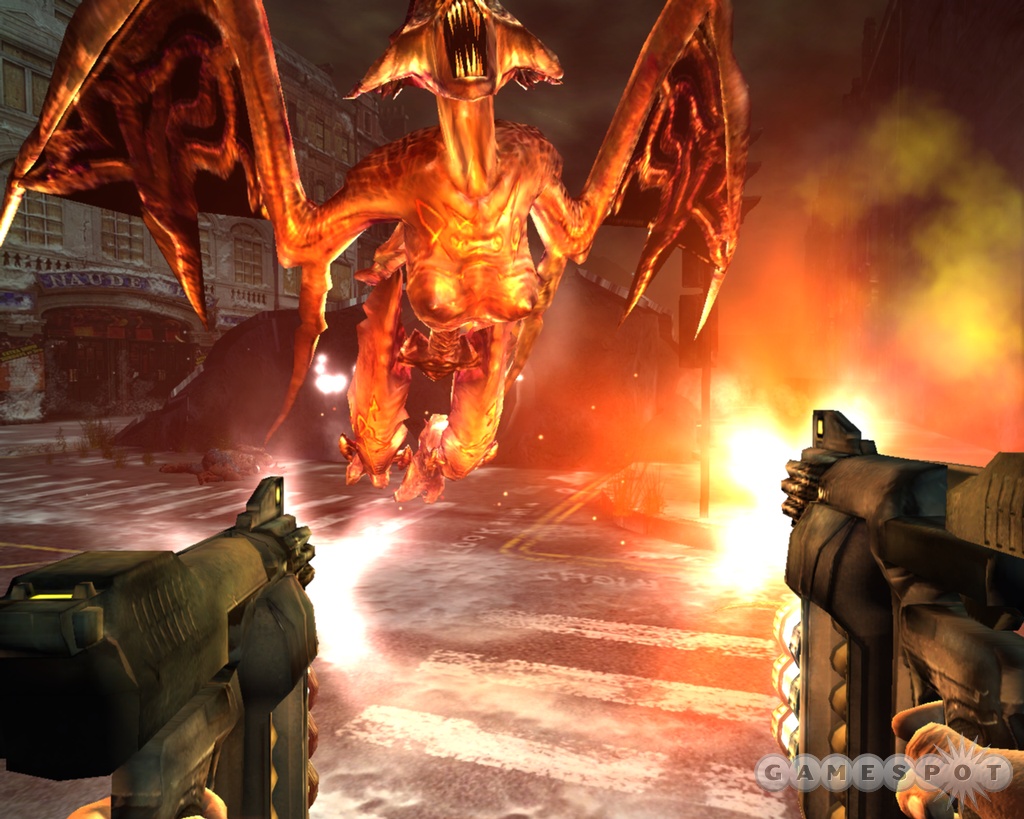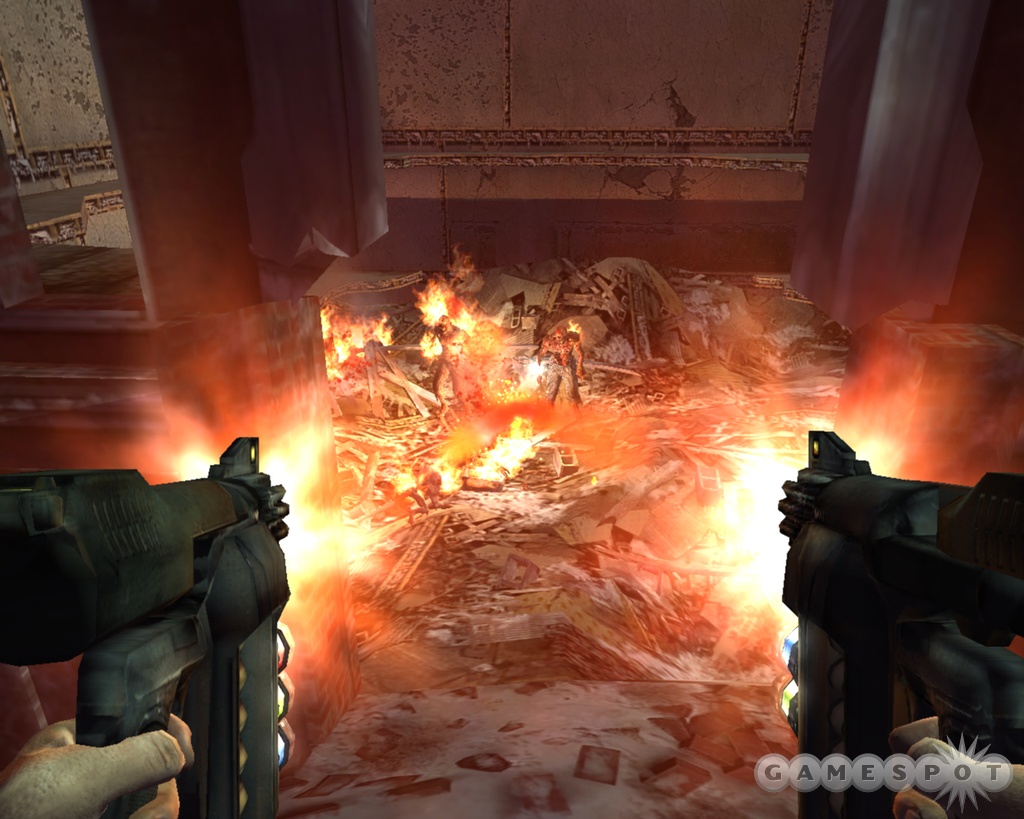Hellgate: London Q&A - Overview
Chief creative officer Erich Schaefer discusses this upcoming game from the creator of Diablo II.
You could say that hack-and-slash gameplay--that is, bashing monsters to gain their treasures and to gain experience levels--is a key part of role-playing games. It sure was for the Diablo games--a series of fast-paced action role-playing games that let players play as a fantasy character, like a wizard or a barbarian, and click their buttons right off their mice hacking away at monsters in dank dungeons. Much of the Blizzard North team has since moved on to create Flagship Studios, and now, Flagship is finally ready to talk about its first game, Hellgate: London. The new fully 3D game will be a first-person hack-and-slash RPG that takes place in a near-future version of London, overrun by demons and inhabited by a few lone survivors who are desperately fighting back the invasion. We sat down with chief creative officer Erich Schaefer for more details on the game and on one of its character classes, the noble templar.

GameSpot: Tell us about what Hellgate: London is and what it isn't. Will the game emphasize addictive hack-and-slash gameplay with repeated play-throughs like Diablo, or will the game put more emphasis on story and quests?
Erich Schaefer: The experience of Hellgate: London will be very visceral. Expect plenty of random, slot-machine-style loot and an infinite variety of combat situations. Coupled with randomly generated, respawning levels, this hack-and-slash gameplay will likely encourage repeated play-throughs and hopefully lead to long-term replay value. That said, we plan to more fully incorporate our quest structure into the game experience. The storyline quests will drive the story, not just serving as random chores along the way. We also intend to create randomized missions to provide a little more meaning for the hack-and-slash.
GS: Like many fans of the team's previous work at Blizzard North, we were intrigued to hear that several members of the team that created the Diablo series were working on an all-new role-playing game. However, like many fans who heard more details, we were shocked to hear that the game would be a 3D game that uses a first-person perspective. Why was this decision made, and how will it work in the game?
ES: Many factors led to us deciding to use a first-person perspective. Primarily, we wanted to create a more-immersive atmosphere, but taking on a brand-new challenge also appealed to us. We believe that there are no other games like Hellgate: London, so we saw a chance to blaze a new trail and not simply create clones of our past successes. We really liked the pacing and reward structure of Diablo, and fans will hopefully be comfortable with the switch in viewpoints, because in most other respects, it is surprisingly similar.
GS: We understand that the game will be set in a near-future version of London, England, overrun with monsters from hell. Why was this unusual setting chosen over, for instance, a traditional medieval fantasy setting?
ES: The near-future setting, like the first-person viewpoint, was chosen largely as a product of a desire for a change of pace. The team wanted to try new things, and it's been a while since we've played a good item-oriented, near-future RPG.
GS: What can you tell us about the game's character classes (like the templar) and its character development system? Are we in for a system that features branching trees of skills that will help players make highly different versions of the same profession? Will the system be an extension of what we saw in Diablo II? What will be new?
ES: The skill system is currently in flux. Originally we were planning to have skill maps, which would be an extrapolation of Diablo II's skill trees. We became concerned that this was too complex and might lead to player's being paralyzed by strange options that they didn't know enough about, so we are experimenting with a new system. It's too early to talk about this new system, because it will probably radically evolve, but one big benefit is the ability to create random and rare skills.
GS: Tell us about the game's loot and weapon system. Even though the game will be played from a first-person perspective using firearm-class weapons, it won't be a first-person shooter. Could you explain how that will work?
ES: The combat system in Hellgate: London is a real-time system with projectiles moving through space and accurately colliding with targets, but what makes it different in feel from first-person shooters is that player reflexes and aim have only a small effect on success. Weapons have various dynamics to make them effective at any player skill level; some home in on targets, some automatically lock on, some have big explosive areas of effect, while others are just too inaccurate to use in any dexterous way. Character effectiveness will be a blend of equipment, skills, attributes, and "buffs," with just a little player skill thrown in.
GS: And more generally, could you discuss how combat is planned to work in general? Will the game feature the same kind of tactical diversity among its character classes in combat as the Diablo games, which featured up-close melee fighters, magic-based sorcerers, and hit-and-run archers?
ES: It's too early for us to discuss any other characters besides the templar, but players can expect a full range of play styles compatible with most RPGs, Diablo included. Even within character classes, some will be more adept at ranged combat, melee combat, stealth, and support roles.
GS: What can you tell us about your plans for multiplayer? Will multiplayer be mainly focused on individual server-based (or direct-IP-based) co-op play? Any plans for competitive modes?

ES: Hellgate: London will support many modes of single-player and online play. Most importantly, we will be providing a destination where players can congregate in large or small numbers within the world. Here, they will be able to group up for adventures, trade items, or just hang out and chat. Plans for competitive modes are just being discussed now, but our main emphasis will be on supporting cooperative adventuring.
GS: Finally, is there anything else you'd like to add about Hellgate: London?
ES: As a gamer, I personally don't like to be told what to do. I don't like looking up solutions on the Web. I don't like having to jump through the same hoops everyone else does. For this reason, we like to shake up the gameplay as much as we can. You won't be able to look up maps online to find where some monster drops what loot. There will be such a huge variety of equipment and character skill choices that people won't be able to post "ideal" builds. What we're aiming for is an open-ended RPG, where players can take a role in creating their own personalized experience.
GS: Thanks, Erich.
Got a news tip or want to contact us directly? Email news@gamespot.com
Join the conversation